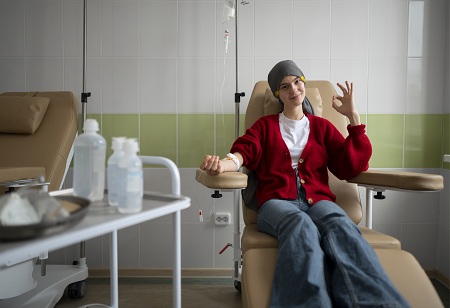Richa Singh,Correspondent,India Pharma Outlook | Saturday, 09 December 2023

“Cancer cells are the normal cells that undergo genetic changes, allowing it to grow and divide very quickly. Precision Oncology is a targeted and specifically designed approach towards cancer cells.” Says Kshitij Rishi, Co-Founder & COO, 4basecare.
Immunotherapy works on the principle that the ability of the body and the immune system to recognize and eliminate cancer cells. One of the most promising tools in this regard is immune response inhibitors. These inhibitors target proteins that act as "brakes" on the immune system, preventing it from attacking cancer cells. By blocking these brakes, immune checkpoint inhibitors unleash the full potential of the immune system to launch a powerful and targeted attack against cancer.
A remarkable example of immunosuppressive success is pembrolizumab (Keytruda). Approved by the US Food and Drug Administration (FDA), pembrolizumab has shown significant efficacy in a variety of cancers, including melanoma, lung cancer, and head and neck cancer. In clinical trials in patients with advanced melanoma treated with pembrolizumab, progression-free survival and overall survival were significantly improved compared with standard chemotherapy.
The story of industry pioneer Jim Allison adds a human dimension to this success. Allison's pioneering work on immune checkpoint inhibitors won her the 2018 Nobel Prize in Physiology or Medicine. His persistence and dedication to understanding the complexities of the immune system led to the development of ipilimumab (Yervoy), another immune checkpoint inhibitor. is a concrete example of how scientific innovation can translate into life-saving treatments.
Immunotherapy has ushered in a new era of personalized medicine, which tailors treatment to individual patients based on their unique genetic makeup and cancer-specific characteristics. Chimeric antigen receptor T cell therapy (CAR-T) is an example of this paradigm shift. CAR-T therapy involves isolating a patient's own T cells, genetically modifying them to express a receptor that targets cancer cells, and then infusing those enhanced T cells back into the patient.
A notable example of CAR-T therapy and success is Kymriah (tisagenlecleucel), which is approved to treat certain types of lymphomas and acute lymphoblastic leukemia. In clinical trials, Kymriah showed unprecedented response rates and achieved remission in patients who had exhausted all other treatment options. This approach highlights the potential of personalized immunotherapy to provide targeted and highly effective therapy, offering new hope for patients with an otherwise poor prognosis.
However, it is important to recognize the challenges associated with CAR-T therapy, including the potential for serious side effects such as cytokine release syndrome. Ongoing research and development aims to refine and improve the safety profile of CAR-T therapies, highlighting the dynamic nature of immunotherapy research and development.
Immunotherapy and versatility are moving beyond stand-alone therapies as researchers increasingly explore combination therapies that utilize the synergistic effects of different forms of therapy. Combining immunotherapy with conventional treatments such as chemotherapy or radiotherapy can improve the overall anticancer response, taking into account the limitations of each approach when used alone.
A combination of immunotherapy and targeted therapies is an example of the success of nivolumab (Opdivo) in the treatment of advanced renal cell cancer (renal cancer). In clinical trials, the combination of nivolumab and ipilimumab showed superior efficacy compared to conventional targeted therapies, leading to its approval by the FDA. This approach shows how a comprehensive understanding of cancer biology can help develop combination therapies that exploit the multiple vulnerabilities of cancer cells.
In addition, ongoing research is investigating the integration of immunotherapy with other new technologies, such as oncolytic viruses and cancer vaccines, to improve the immune response against cancer. These innovative combinations hold the promise of expanding the cancer treatment arsenal and overcoming the challenges of drug resistance.
Immunotherapy and its emergence as a huge player in the field of cancer treatment is rewriting the story of countless patients around the world. From unleashing the immune system and its hidden potential to embracing the era of personalized medicine and exploring synergistic combination therapies, immunotherapy is a beacon of hope in the fight against cancer. As research and development continue to elucidate the complexities of the immune system and cancer biology, the future promises even more amazing discoveries that will further refine and change the landscape of cancer treatment. The ongoing pursuit of scientific excellence in immunotherapy is not only a medical endeavour, but also a testament to the of patience and determination